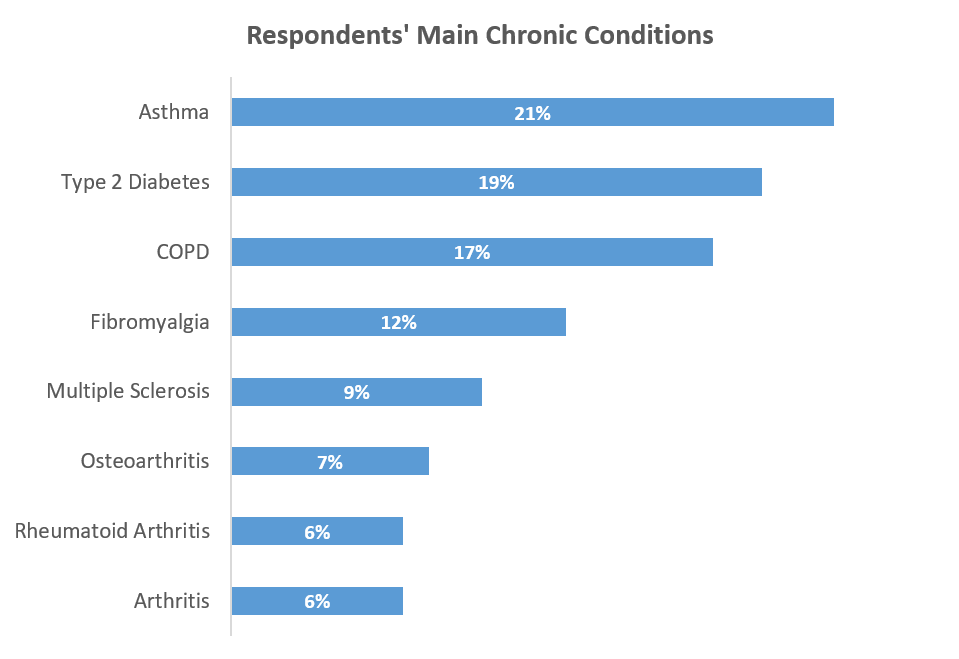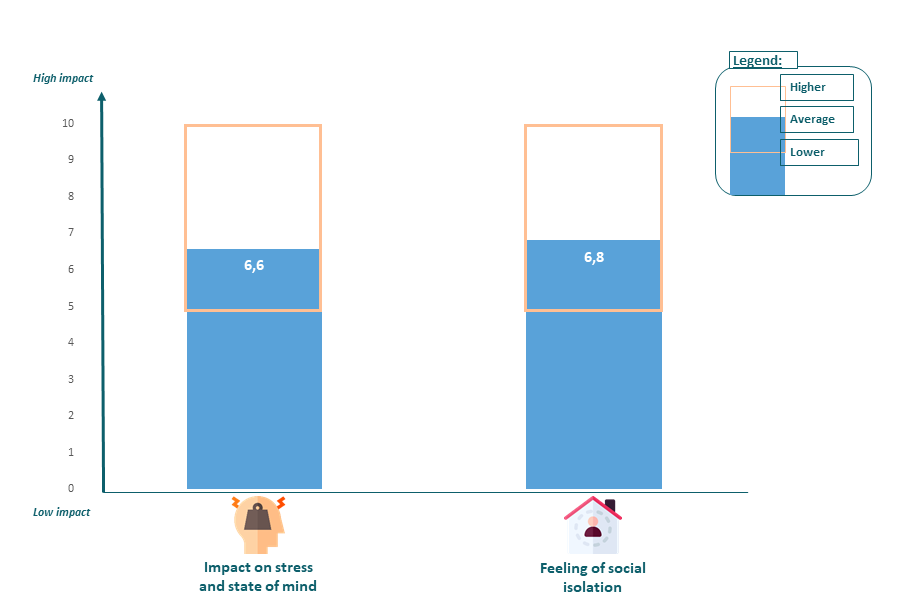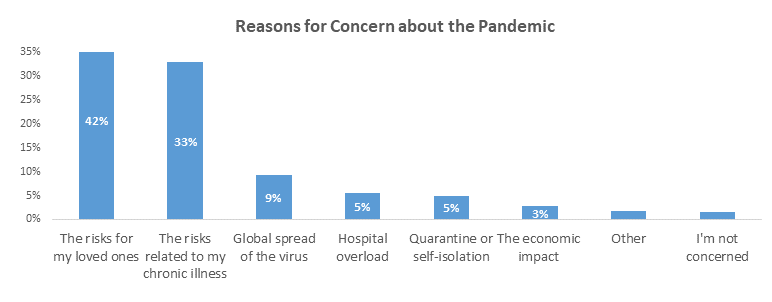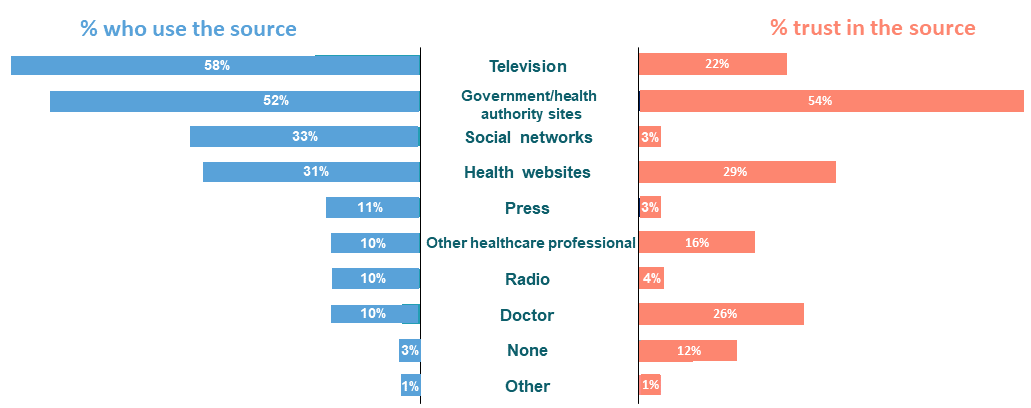COVID-19 and Chronic Illness: Patients Sound the Alarm
Published 16 Apr 2020 • Updated 17 Apr 2020 • By Candice Salomé
Carenity conducted a survey to measure in real time the impact of the COVID-19 epidemic on access to care and quality of life for chronic patients, a population that is particularly vulnerable in this time of pandemic and lockdown. While attention is primarily focused on the care for people affected by COVID-19, the risk of chronic patients discontinuing their medications or treatments is real. It should be remembered more than 15 million people in the UK are living with at least one chronic illness, many of whom require regular care.

1,402 chronic patients responded to our survey. We now know more about their experiences of the pandemic and self-isolation.
1,402 patients and relatives of patients in the UK participated in our survey conducted from March 19, 2020. Respondents are mostly women (82%) with an average age of 55 years.
A large majority of these respondents live in a house with a garden (74%) or in a flat with at least 2 rooms (16%). 3% of them live in a studio flat.
86% of respondents live with a chronic disease:

The majority of respondents have asthma (21%), type 2 diabetes (19%), COPD (17%) and fibromyalgia (12%). Many patients are living with multiple chronic conditions.
89% of patients are currently taking a background therapy for their chronic disease.
Very few patients have been tested for COVID-19
In our study, the number of people tested for coronavirus was very low (only 18, or 1.28%). Among them, only 0.71% tested positive.
We were also able to share a testimonial from Tim, a 34-year-old asthma patient since childhood, who was recently infected by COVID-19.
If you have also tested positive for COVID-19 and would like to share your story,
do not hesitate to contact us by email at contact@carenity.com
Since the start of the outbreak, most members (46%) have not changed the frequency at which they consult their doctor. Of those who have, 45% are seeing their doctor less than usual.
Among the 89% of patients on a background therapy, only 10% have changed how often they take it and 5% have stopped taking their medication.
It is recommended that you seek advice from your doctor before making any changes to your treatment..
Since the beginning of the pandemic, nearly 2 in 10 patients have had difficulty finding treatment.
Since the start of the health crisis, 15% of patients surveyed have had difficulty finding their treatment at the pharmacy.
Not all pathologies are impacted in the same way. The most affected pathologies are the following:

Fibromyalgia and rheumatoid arthritis patients have found it more difficult to find their background therapy at the pharmacy in recent days. This may be due in part to clinical trials using hydroxychloroquine (Plaquenil) in the treatment of COVID-19.
Since the start of the outbreak, 1 in 4 patients has had difficulty finding an available doctor.

Patients with asthma had the most difficulty finding an available physician (33%), followed by patients with osteoarthritis (31%), fibromyalgia (30%) and arthritis (27%).
40% of respondents have had a medical consultation or surgery cancelled or postponed..
Stress and isolation overwhelms patients
Regarding professional life, 9% of respondents are on sick leave and 8% are working from home. 6% are laid off and another 6% are on paid or unpaid leave.
When asked "On a scale of 1 to 10, how well are you following the barrier gestures?”, respondants indicated that they are following them well, with an average score of 9 out of 10 for the following gestures: washing hands regularly, coughing and sneezing into one's elbow or a tissue, greeting without shaking hands or kissing and social distancing.
The pandemic has had a significant impact on respondents' levels of stress and social isolation. Their stress level stands at an average of 6.8 out of 10 and their isolation at an average of 6.6 out of 10.

33% are concerned about the impact of COVID-19 on their health due to their chronic illness, but 42% are worried for their loved ones. Over 9% of respondents fear the spread of the virus around the world, while 5% worry about hospital overload.

Sources of information: a wide gap between use and trust

58% of those surveyed use the television to keep informed of the current situation. Official government sites (52%) are the second most common source of information, followed by social networks (33%) and health websites (37%).
However, the sources which respondents trust the most are very different. Government websites (54%) are most trusted for their quality of information, followed by health websites (29%), doctors (26%) and television (22%). Social networks, though frequently consulted, are among the least trusted (3%).
Almost 3 patients out of 10 are severely lacking information related to their disease and COVID-19
27% of patients do not feel sufficiently informed about the risks associated with their disease. Many patients have questions such as:
- “What are the additional risks associated with my disease?”
- “I'd like to know the risks associated with my treatment?”
- “Should I be taking any extra precautions?”
In an article published in our Health Magazine, Coronavirus and Chronic Illness, we provide concrete answers for patients with chronic diseases faced with the COVID-19 pandemic.
Survey conducted by Carenity among 1,402 patient respondents or relatives of patients in the United Kingdom.
Are you worried about your health? Are you afraid to bother your doctor? Do you hesitate to go to hospital for your usual care? Do you continue to take your treatment normally? Have you been confronted with a shortage of your medication at the pharmacy? Are you lacking information about the COVID-19 outbreak?
Feel free to comment on this article!

 Facebook
Facebook Twitter
Twitter





